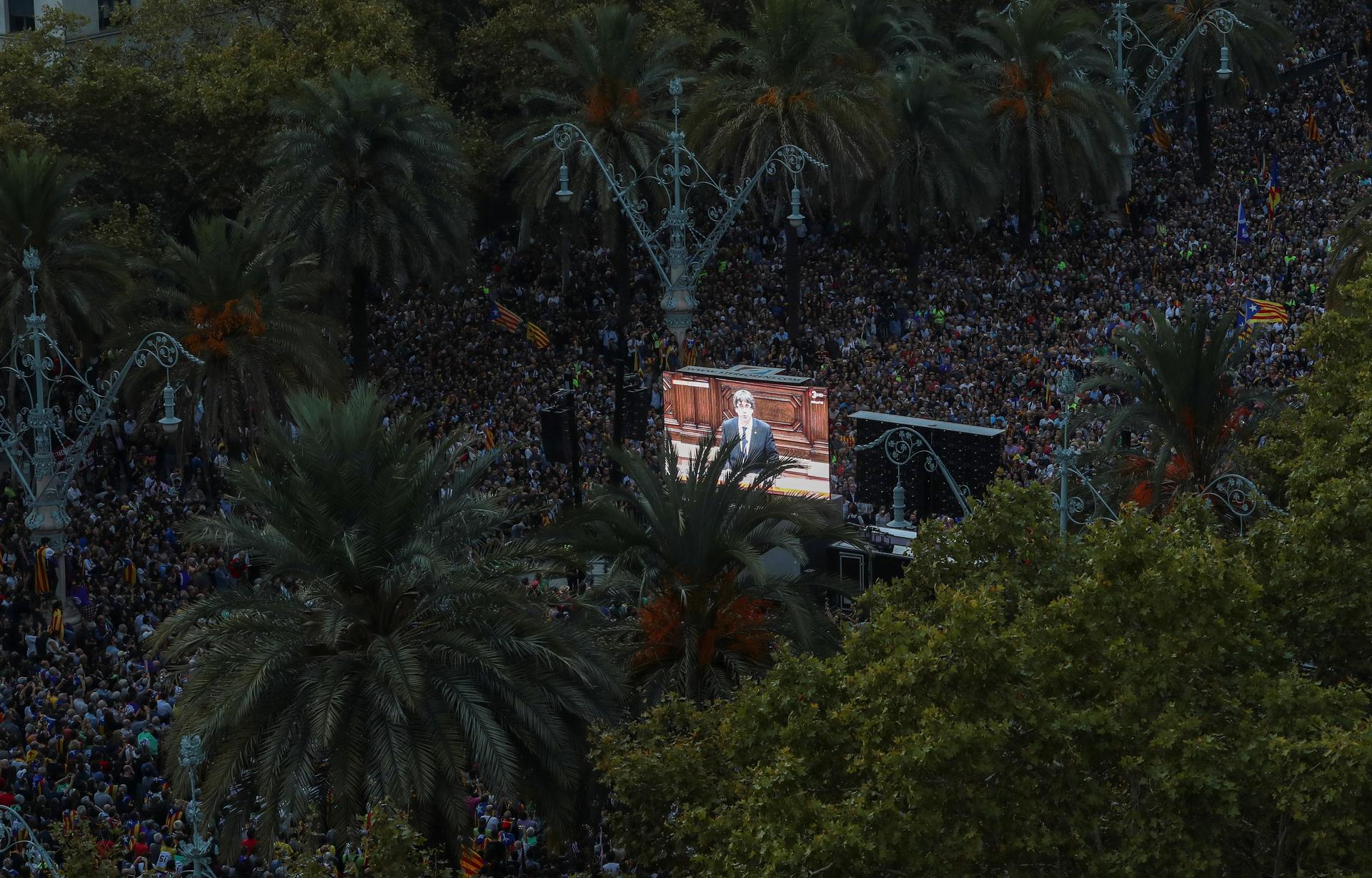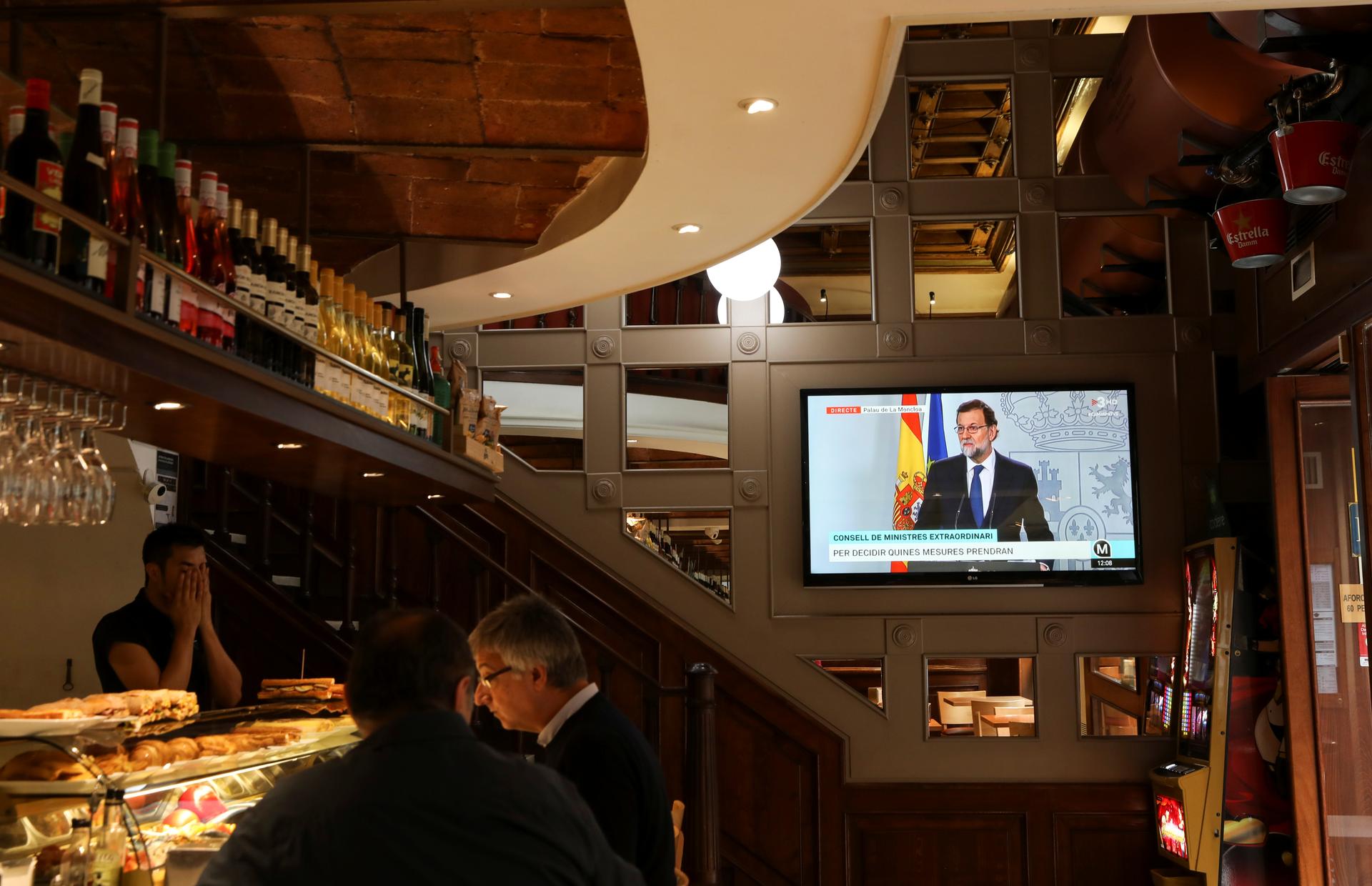Spain vows ‘all options’ open in Catalonia crisis talks
Spain's Prime Minister Mariano Rajoy is seen delivering a statement on a television screen at a bar in Barcelona, October 11, 2017.
Spain's Prime Minister Mariano Rajoy has vowed to do everything in his power to prevent Catalan independence following a banned referendum in the region, which remains deeply divided over splitting from Spain.
And he has refused to rule out imposing direct rule over the semi-autonomous region of 7.5 million people — a move many fear could lead to unrest.
Rajoy called an emergency meeting after Catalonia's president Carles Puigdemont announced on Tuesday that he had accepted the mandate for "Catalonia to become an independent state" following the October 1 referendum.
But in a parliamentary speech Puigdemont immediately called for independence to be suspended to allow for negotiations with the central government.
On Wednesday, a government source who refused to be named said "all options" were on the table as crisis talks were under way.
Rajoy has also asked Catalonia's leader to clarify whether or not he had actually declared independence.
"The cabinet agreed this morning to formally ask the Catalan government to confirm whether it declared Catalan independence," he said in a televised statement.
'Destructive force'
While separatist leaders say 90 percent of voters opted to split from Spain in the October referendum, less than half of the region's eligible voters actually turned out.
At stake is the future of one of Spain's economic powerhouses and its main tourist destination.
The drive to break Catalonia away from Spain has raised concern for stability in a European Union still coming to terms with Britain's shock decision to leave the bloc.

Crowds of thousands gathered outside the parliament building in Barcelona on Tuesday ahead of Puigdemont's speech, waving Catalan flags and banners and screaming "democracy" in the hope of witnessing history in the making.
But Spain's political establishment rounded on Puigdemont following his declaration, and support among separatists in Catalonia was mixed.
Barcelona resident Maria Rosa Bertran said she was against a delayed secession, which meant "suffering a longer agony. Indecision and uncertainty is the worst thing that can happen to us," she told AFP.
The government stuck to its stance that it would not accept mediation or any talks until Catalan leaders drop their independence bid.
"Mr Puigdemont — no one — can expect to impose mediation without returning to legality or democracy," Deputy Prime Minister Soraya Saenz de Santamaria told reporters.
She said Puigdemont was "a person who doesn't know where he is, where he's going or with whom he wants to go."
Foreign minister Alfonso Dastis told lawmakers in Madrid that separatists were "a destructive force that proposes to defeat democracy, destroy the state of law and put Europe at risk."
Unknown consequences
Following his declaration to parliament, Puigdemont and his allies signed an independence declaration outside the chamber, but its legal validity was unclear.
Regional government spokesman Jordi Turull said the declaration was "a symbolic act", adding that any official decision would need to be decided by the Catalan parliament.
It is unclear how Puidgemont's play for time will be received in Madrid, which has consistently said independence is not up for discussion.
"I did not expect independence to be declared today because of all the processes that the government of Spain has begun, both with police actions and with threats," Marc Cazes, a student in Barcelona, said on Tuesday.
The crisis has caused deep uncertainty for businesses in one of the wealthiest regions in the eurozone's fourth-largest economy.
A string of companies have already moved their legal headquarters — but not their employees — from Catalonia to other parts of the country.
But on Wednesday morning, the Spanish stock market rose 1.16 percent on hopes for a breakthrough in the crisis.
Demands for independence in Catalonia, one of Spain's 17 semi-autonomous regions which has its own language and cultural traditions, date back centuries.
But a 2010 move by Spain's Constitutional Court to water down a statute that gave Catalonia additional powers, combined with a deep economic meltdown in Spain, sparked a surge in support for independence.
by Marianne Barriaux with Daniel Bosque/AFP
